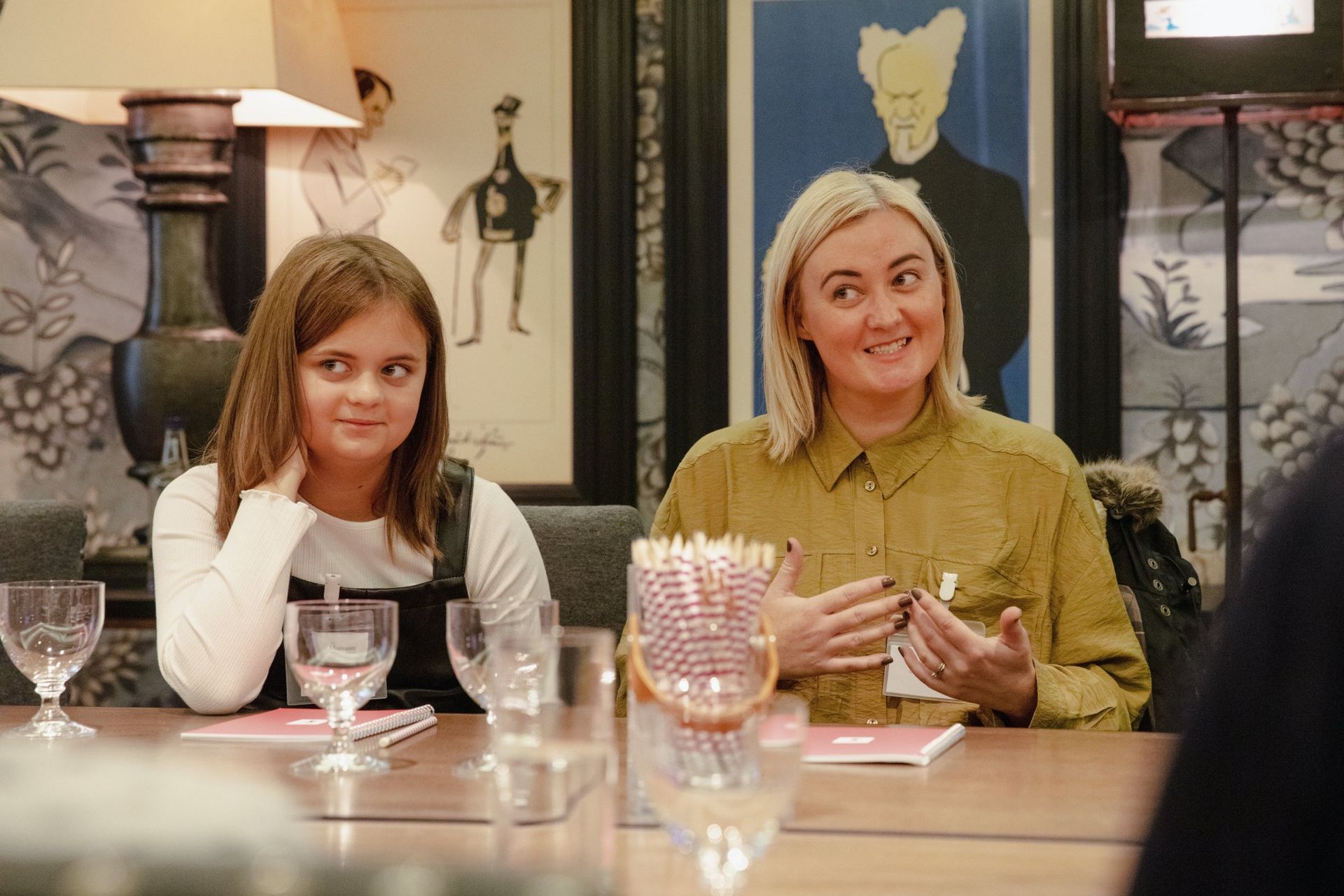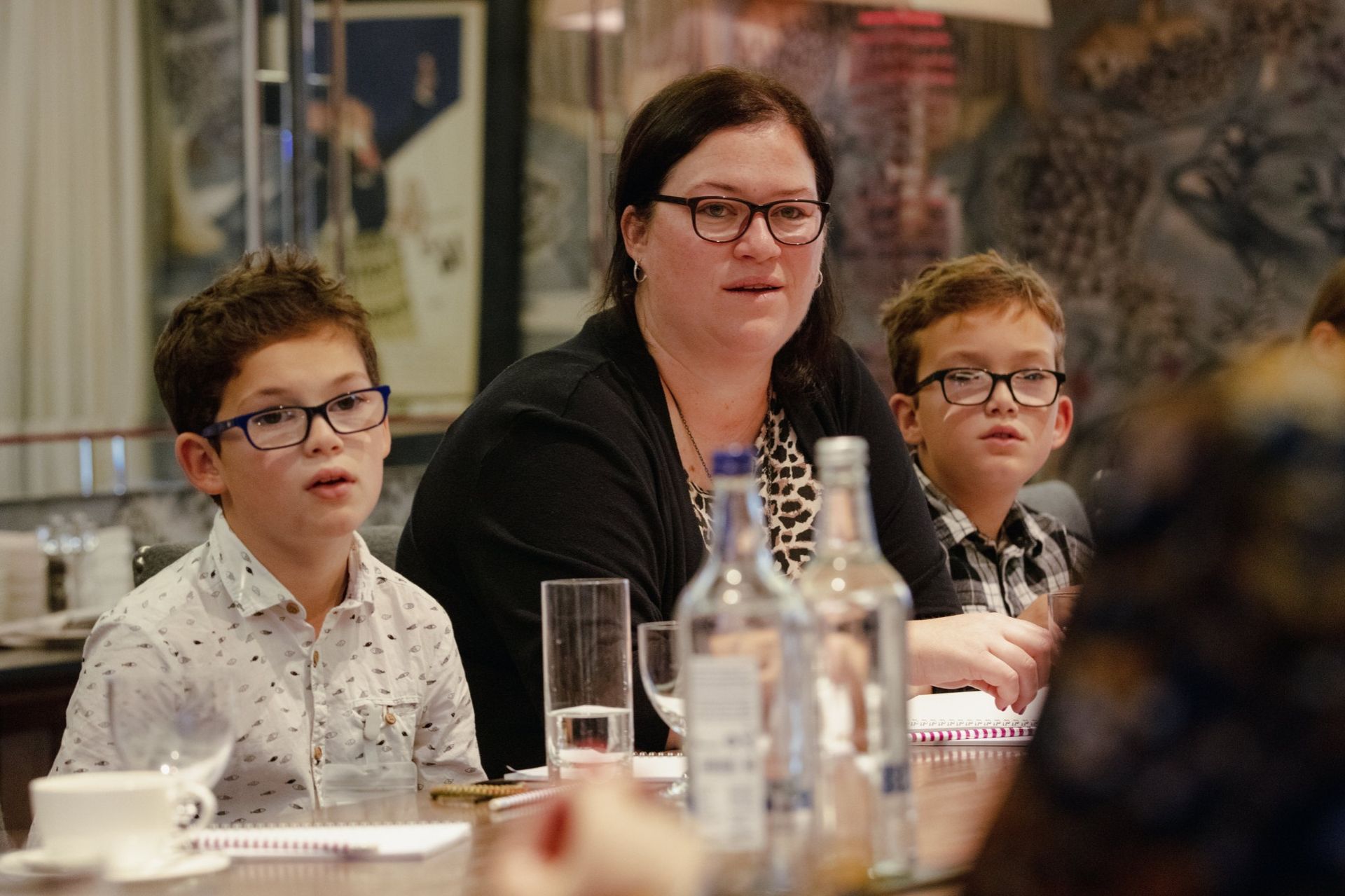尊敬的用户您好,这是来自FT中文网的温馨提示:如您对更多FT中文网的内容感兴趣,请在苹果应用商店或谷歌应用市场搜索“FT中文网”,下载FT中文网的官方应用。
How much have you talked to your children about the cost of living crisis?
关于生活成本危机,你和你的孩子谈过多少次?
Our instinct as parents is to shield our children from the financial problems of the adult world, but it’s getting harder to do.
作为父母,我们的本能是保护我们的孩子远离成人世界的经济问题,但这越来越难做到。
Even if your family has been able to absorb the impact of rising prices, children are picking up on news reports about soaring bills, strikes over pay and political upheaval.
即使你的家庭已经能够承受物价上涨的影响,孩子们也会从新闻报道中了解到账单飙升、工资罢工和政治动荡。
While younger children might be blissfully unaware, older children may have overheard their parents fretting about mortgage rates, the
weekly shop or how household budgets might need trimming.
虽然年幼的孩子可能懵然不知,但年长的孩子可能已经听到他们的父母在为抵押贷款利率、每周购物或家庭预算可能需要削减而烦恼。
How included should they be in these conversations? Parents don’t want children to worry, but as mortgage costs soar, even fairly affluent families are cutting treats, and don’t want children to feel this is somehow their fault.
他们应该如何参与这些对话?父母不希望孩子们担心,但随着抵押贷款成本的飙升,即使是相当富裕的家庭也在削减开支,而且不希望孩子们觉得这在某种程度上是他们的错。
“My 10-year-old daughter Maddie is very aware of what’s going on as she overhears us talking, but I still want her to be a kid,” says Katie Handsley, a clerical worker from Aberdeen. “As much as we’d like to give her everything in the world, it’s just not possible in the current climate. But I also want her to know we’re not being horrible when we say no; there’s a reason behind it.”
来自阿伯丁的一名职员凯蒂·汉德斯利(Katie Handsley)说:“我10岁的女儿麦迪在无意中听到我们的谈话时,非常清楚发生了什么,但我还是希望她还是个孩子。尽管我们很想给她世界上的一切,但在目前的气候下这是不可能的。但我也想让她知道,当我们说不的时候,并不是我们想对她不好;这是有原因的。”
For older children, the financial pressures move beyond
pocket money. Wealth managers say that falling investment values combined with cost of living pressures could affect the ability of Bomad (the Bank of Mum and Dad) to provide property deposits for adult offspring. Plus, the
high cost of childcare means that Nomad (the Nursery of Mum and Dad) is increasingly being relied upon to look after the grandchildren
gratis. 对于大一点的孩子来说,经济压力不仅仅是零花钱。理财经理们表示,投资价值不断下降,再加上生活成本压力,可能会影响Bomad(父母银行)为成年后代提供房产存款的能力。此外,高昂的托儿费用意味着,越来越多的人依赖Nomad(父母的托儿所)来免费照顾孙辈。

Takeaways are off the menu for Maddie Handsley and mother Katie:

麦迪·汉德斯利(Maddie Handsley)和母亲凯蒂的菜单上没有外卖:
Pocket money
零花钱
The cost of living crisis has blighted the financial lives of millions of families, and prompted children to ask many questions about money.
生活成本危机已经破坏了数百万家庭的财务生活,并促使孩子们问了许多关于钱的问题。
“Money touches every single part of our lives, and if you hide it or shelter your kids from it, you’re not going to be helping them in future,” says Louise Hill, co-founder of gohenry, a children’s savings app.
儿童储蓄应用gohenry的联合创始人路易丝•希尔(Louise Hill)表示:“金钱涉及我们生活的方方面面,如果你把钱藏起来或让孩子远离它,你在未来就不会帮助到他们。”
There have been clear changes in pocket money spending, according to data sourced from over 435,000 UK children using gohenry’s prepaid contactless cards.
根据来自43.5万多名使用gohenry预付费非接触式卡的英国儿童的数据显示,他们的零花钱支出发生了明显的变化。
The majority of 6 to 18-year-olds spent much less on “non-essentials” in the first half of 2022 than a year previously. Categorised by merchant, the amount children spent fell by 32 per cent on toys, 14 per cent on fashion and clothing, and 11 per cent on online gaming.
2022年上半年,大多数6至18岁的年轻人在“非必需品”上的支出比去年同期少得多。按商家分类,儿童在玩具上的支出下降了32%,在时装和服装上的支出下降了14%,在网络游戏上的支出下降了11%。
32%Percentage of children who spent less on toys in the first half of 2022, among gohenry’s 435,00 customers
32%在gohenry的4.35万名顾客中,2022年上半年在玩具上花费较少的儿童比例
However, the number of children using their cards to spend on “essential” categories such as supermarkets increased by 17 per cent, suggesting more are using pocket money to buy food and everyday items.
然而,使用他们的卡在超市等“必要”类别上消费的儿童数量增加了17%,这表明更多的人在使用零花钱购买食品和日常用品。
The amounts that children are saving has also risen by just over 14 per cent in the same period, suggesting that more of them are targeting bigger purchases.
同期,孩子们的储蓄金额也上升了14%多一点,这表明他们中有更多的人打算购买更多的东西。
Michelle Dickson, a local government administrator from Weston-super-Mare, uses gohenry cards with her two sons Liam, 10, and Benjamin, 7, as a way of teaching budgeting. Her own budget has been under pressure, but she hasn’t had direct conversations with her sons about the war in Ukraine or why inflation is soaring.
米歇尔•迪克森(Michelle Dickson)是Weston-super-Mare的一名地方政府行政人员,她和两个儿子——10岁的利亚姆(Liam)和7岁的本杰明(Benjamin)——用gohenry卡来教孩子们做预算。她自己的预算也面临压力,但她没有和儿子们直接讨论乌克兰战争或通货膨胀飙升的原因。
“They hear a lot about the cost of living in the news and a little bit at school, but I don’t want to scare them,” she says.
她说:“他们在新闻中听到了很多关于生活成本的消息,在学校里也听到了一些,但我不想吓到他们。”
“Mum’s always saying don’t leave the lights on, or don’t turn on the heating,” says Liam.
利亚姆说:“妈妈总是说不要开着灯,也不要开暖气。”
Seven-year-old Benjamin saved up for months to buy a pair of rollerblades. He was happy to buy them, but “felt sad” when he saw all the money had gone from his account.
7岁的本杰明攒了好几个月的钱买了一双旱冰鞋。他很高兴买了它们,但当他看到所有的钱都从他的账户中消失时,“感到很难过”。
One thing is certain — whether or not we talk to our children about the cost of living, they’re picking up how concerned we are. Nearly three-quarters of 2,000 children and teenagers surveyed by gohenry said they were worried about the cost of living crisis, including rising food and energy bills.
有一件事是肯定的——无论我们是否和孩子们谈论生活成本,他们都会意识到我们有多关心生活成本。gohenry调查的2000名儿童和青少年中,有近四分之三的人表示,他们担心食品和能源价格上涨等生活成本危机。
71%Percentage of children and teenagers worried about the cost of living crisis. Survey of 2,000 youngsters by gohenry
71%担心生活成本危机的儿童和青少年比例。gohenry对2000名年轻人进行了调查
Nearly 8mn Britons are finding it a “heavy burden” to keep up with their bills, up from 5mn in 2020,
according to the UK financial regulator. More than 4mn people have missed a bill or credit card payment in more than three of the past six months, and charities expect distress levels to increase over the winter.
根据英国金融监管机构的数据,近800万英国人发现支付账单是一个“沉重的负担”,高于2020年的500万。在过去6个月里,有超过3个月的时间里,超过400万人错过了账单或信用卡付款,慈善机构预计,在冬季,这种痛苦程度将会增加。
Even if more affluent households have absorbed rising costs, children are aware that their friends and classmates are being affected.
即使更富裕的家庭已经吸收了上涨的费用,孩子们也知道他们的朋友和同学正在受到影响。
Michelle says the main change for the Dickson family is no more foreign holidays. “You worry the kids will ask how come [our friends] can have a trip to Disneyland or a brand new PlayStation and we can’t?”
米歇尔说,迪克森一家最大的变化就是不再去国外度假了。“你担心孩子们会问,为什么(我们的朋友)可以去迪士尼乐园旅行,或者可以买一台全新的PlayStation游戏机,而我们却不能?”
Katie has told her daughter that expectations for Christmas presents “need to be different this year” and the family has cut back on eating out.
凯蒂已经告诉她的女儿,对圣诞礼物的期望“今年要有所不同”,而且全家已经减少了外出就餐。
“We used to get a takeaway every Saturday, but the cost for the three of us has gone from £23 to £36,” she says. Instead, she and her 10-year-old daughter have been finding recipes for “Fakeways” on TikTok, and Maddie proudly tells me about making egg fried rice with her mum: “It was so fun.”
她说:“我们过去每周六都叫外卖,但我们三个人的花费已经从23英镑涨到了36英镑。”相反,她和10岁的女儿一直在TikTok上寻找“Fakeways”的食谱,麦迪自豪地告诉我,她和妈妈一起做鸡蛋炒饭:“太有趣了。”
Of the 2,000 children and teenagers surveyed, one in three said they would happily go without having treats or new toys for a month if this helped their families pay for essentials. In real life, millions of other children don’t have a choice.
在接受调查的2000名儿童和青少年中,三分之一的人表示,如果这能帮助他们的家庭支付必需品,他们会很乐意在一个月内不吃零食或新玩具。在现实生活中,数以百万计的其他孩子别无选择。
One colleague recently had a heart-to-heart with his son after he found him sitting in the dark playing computer games as he was “trying to save money”.
一位同事最近发现他的儿子坐在黑暗中玩电脑游戏,因为他“想省钱”,于是与他的儿子进行了一次谈话。
Some parents who contacted me on social media say they don’t watch the news as they don’t want their children to have nightmares about energy blackouts, recession or the prospect of nuclear war.
一些在社交媒体上与我联系的家长说,他们不看新闻,因为他们不想让孩子做关于能源短缺、经济衰退或核战争前景的噩梦。
Another was angry that “the 0.01 per cent of privileged kids are actually having to have it explained to them what the cost of living crisis is,” adding: “The struggle is real!”
另一位家长则愤怒地表示,“那0.01%的特权阶层孩子实际上不得不让人向他们解释生活危机的成本是什么”,并补充道:“这种斗争是真实的!”
Other parents were eager to reassure their children, but also wanted them to realise how privileged they are.
还有一些父母急于安抚自己的孩子,但也希望他们意识到自己是多么的幸运。
“I spend time reassuring my children about how we are coping by giving them a budget that they can decide how to spend on their own treats,” one mum says. “On Halloween night, I noticed they were very generous with the candy and satsumas they gave out as they were worried some of the other kids might not have had treats for a while.”
一位母亲说:“我花时间安抚我的孩子们,告诉他们我们是如何应对的,给他们一个预算,让他们自己决定怎么花在自己的零食上。在万圣节的晚上,我注意到他们非常慷慨地分发糖果和小蜜桔,因为他们担心其他孩子可能有一段时间没有吃的了。”

Turning out the lights: Benjamin, left, and Liam Dickson, with mother Michelle

关灯:本杰明(左),利亚姆•迪克森和母亲米歇尔
Financial lessons
财务课程
In the classroom, children are more eager than ever to learn about money.
在课堂上,孩子们比以往任何时候都更渴望学习金钱知识。
“What we see, particularly with younger children, is that they’re asking questions about things they’re seeing and hearing in the news,” says Rebekah Young, senior fundraising manager at MyBnk, a financial education charity.
金融教育慈善机构MyBnk的高级筹款经理丽贝卡•杨(Rebekah Young)表示:“我们看到的情况是,他们对自己在新闻中看到和听到的事情会提出疑问,这一点在年龄较小的孩子身上尤为明显。”
‘What is inflation?’ is a common question she hears; but since the “mini” Budget, even year 7 children have been quizzing her about tax and national insurance.
“什么是通货膨胀?”这是她经常听到的一个问题;但自从“迷你”预算出台以来,甚至连七年级的孩子都在问她有关税收和国民保险的问题。
“Children are trying to draw connections between what they’re seeing in the news, and what these things actually mean for them,” she says. “It’s important to have conversations when you’re going around the supermarket making purchasing decisions, and how to tell the difference between a want and a need.”
“孩子们试图将他们在新闻中看到的东西与这些东西对他们的实际意义联系起来,”她说。“当你在超市里做购买决定,以及如何区分想要的和需要的时候,交谈是很重要的。”
Sixteen-year-old Lucy Roche from Dublin has learned a lot about inflation at college, as she’s studying business — but she’s aware most of her friends know nothing. “It didn’t feel too relevant when we first learned about it, but now it’s coming in handy,” she says.
来自都柏林的16岁的露西·罗奇(Lucy Roche)在大学里学到了很多关于通货膨胀的知识,因为她正在学习商业--但她知道她的大多数朋友都一无所知。她说:“当我们第一次了解它时,它感觉不太相关,但现在它派上了用场。”
She and her friends have noticed how clothes prices are rising fast, but are using apps such as Depop and Etsy to buy and sell clothing. “There are no careless purchases now,” she says.
她和她的朋友们已经注意到衣服价格上涨得很快,但他们正在使用Depop和Etsy等应用程序买卖衣服。她说:“现在没有人会随便买东西了。”
Others say they are encouraging their children to watch the news, and using this to start conversations about money.
另一些人则表示,他们鼓励孩子看新闻,并借此开始谈论金钱。
“My nine-year-old daughter has really got involved with the news, and understands about the effects the war in Ukraine is having,” says FT reader Dija Ayodele.
英国《金融时报》读者Dija Ayodele表示:“我9岁的女儿真的很关注新闻,她了解乌克兰战争的影响。”
“I run a business, and it really hit home for her when I had to make staff redundant — she saw a clear link then. My husband has schooled her on the electricity bill and she’s now the smart meter monitor.”
“我经营着一家企业,当我不得不裁员时,这对她打击很大——她看到了其中明显的联系。我丈夫教她注意电费,现在她简直就是个智能电表监控器。”
Michelle’s two sons are both keen footballers, which means football boots are an expensive necessity — although they cancelled their subscription to Match of the Day magazine after the price increased. “We use Vinted and eBay to buy secondhand football boots, and the boys sell their old ones too,” she says.
米歇尔的两个儿子都是足球爱好者,这意味着足球鞋是一种昂贵的必需品——尽管在价格上涨后,他们取消了订阅《每日比赛》杂志。她说:“我们用Vinted和eBay买二手足球靴,孩子们也卖旧的。”
Liam tells me he’s been shopping around online for bargains. “I recently bought a magnet pen for £5, but the first one I saw was £15,” he says.
利亚姆告诉我他一直在网上买便宜货。他说:“我最近花5英镑买了一支磁铁笔,但我看到的第一支要15英镑。”
Does he know the difference between a “want” and a “need”?
他知道”想要“和”需要“之间的区别吗?
“A need is spending money on electricity, broadband and clothing — but not fancy, branded clothing,” he says.
他说:“人们需要花钱买电、宽带和服装,但不是花俏的名牌服装。”
And what’s a luxury? “Espresso pods,” he says. “No, those are definitely a need!” says his mum. Even so, she’s saving money buying dented and less-than-perfect pods via the
Odd Coffee Company.
Just giving
只是给予
All the parents who contributed to this article recognise that, while they have to cut back, many others are in a far worse position.
所有为本文投稿的父母都认识到,虽然他们必须削减开支,但许多其他人的情况要糟糕得多。
Many are actively involving their children when making donations to food banks. In the words of one of my social media followers: “My nine-year-old is not being brought up in a bubble.”
在向食品银行捐款时,许多人积极地让自己的孩子参与进来。用我的一位社交媒体粉丝的话来说:“我9岁的女儿不是在泡沫中长大的。”
256%Increase in donations to charity by gohenry users
A significant shift in children’s spending is charity donations. Amounts given to charity by children using gohenry accounts increased by an astonishing 256 per cent in the first half of 2022 with over £435,000 given to good causes compared with £120,000 the year previously.
儿童支出的一个重要转变是慈善捐赠。2022年上半年,儿童通过gohenry账户向慈善机构捐款的金额惊人地增长了256%,用于慈善事业的捐款超过43.5万英镑,而前年为12万英镑。
“When I first saw this data, my instant reaction was that can’t be right, but it is,” says Hill, noting that the figure includes direct donations to charities as well as websites such as JustGiving.com and Change.org.
希尔说:“当我第一次看到这些数据时,我的第一反应是,这不可能是对的,但它是对的。”希尔指出,这个数字包括了对慈善机构的直接捐款以及JustGiving.com和Change.org等网站的捐款。
“It just shows you that children are not only aware of the cost of living crisis, they want to do something about it,” she says.
她说:“这只是表明,孩子们不仅意识到了生活成本危机,他们还想为此做些什么。”
Such donations also rose early in the pandemic, but less dramatically. “Customers told us their children realised there were a lot of people out there in worse situations than they were,” she says. “I think we’re seeing the same sentiment here, but on a much greater scale than before.”
这种捐赠在大流行初期也有所增加,但没有那么显著。她说:“顾客们告诉我们,他们的孩子意识到,还有很多人的处境比他们更糟糕。我认为我们在这里也看到了同样的情绪,但规模比以前大得多。”
For every family prepared to talk to their children about budgeting, there are others desperately hiding the fact that they can’t afford to pay bills. Young from MyBnk encountered one child at a school session who asked “My mum says she’s £500 into her overdraft — what does that mean?”
尽管每个家庭都准备和孩子们讨论预算问题,但也有一些家庭绝望地隐瞒了他们无力支付账单的事实。来自MyBnk的杨在一次学校会议上遇到一个孩子,他问:“我妈妈说她透支了500英镑,这是什么意思?”
Parents believe it shouldn’t just be their job to explain and argue that lessons about money should be on the curriculum in primary and secondary schools. As they navigate the cost of living crisis, they also wish they had been taught more in school.
家长们认为,解释和争论有关金钱的课程应该出现在中小学的课程中,不应该只是他们的工作。在应对生活成本危机的同时,他们也希望自己在学校里得到了更多的教育。
“Knowing the value of money is really, really important,” says Young. “These are complex skills, and to be picking up that knowledge at such a young age is going to be hugely beneficial going forwards. But it’s also a worry because not every child will have that opportunity.”
杨说:“了解金钱的价值真的非常非常重要。这些都是复杂的技能,在这么小的年纪就掌握这些知识将对未来大有裨益。”但这也令人担忧,因为不是每个孩子都有这样的机会。”
Adult children tap the Bank of Mum and Dad
As living costs rise, wealth managers say there is increasing evidence that young adults are turning to parents for help.
“Our financial planners aren’t seeing evidence of parents holding back from helping their children out — quite the opposite, in fact,” says Jason Hollands, managing director of Evelyn Partners, a wealth manager.
Some well-off parents have withdrawn investment capital to pay down their children’s mortgages as interest rates rise, while others are making monthly cash gifts from income to assist adult children with the rising cost of living.
This could involve picking up regular direct costs on behalf of adult children such as vehicle payments, school fees and, increasingly, childcare.
Hollands reports that Nomad — the Nursery of Mum and Dad — is doing brisk business. “Many grandparents may be happy to care for their grandchildren for free, reducing the cost of paying for nursery or childminder costs and enabling a son or daughter to work more hours and improve their household earnings,” he says.
“Not everyone is going to be in this situation — with markets down since the start of the year and living costs rising, doubt about the robustness of their finances is going to creep in,” he adds.
With the inheritance tax nil rate band frozen until 2026, more families are eager to make lifetime gifts and start the seven-year clock ticking, fearing the freeze could be extended. However, these decisions are being weighed against the fall in value of investment portfolios and its impact on retirement plans.
“Future tax rises and rising social care costs are definitely another worry in clients’ minds,” says Andrew Wheeler, head of partnership business development at RBC Brewin Dolphin, a wealth manager. “Some people may feel they can’t be as generous as they could be.”
He also knows of parents supporting adult children with mortgage and rental costs as prices rise. “We’re not into full-blown recession yet,” he says. “If it all goes south, never mind the Bank of Mum and Dad — they’ll be coming back to live in the Hotel of Mum and Dad.”
成年的孩子们会从“父母银行”取款
理财经理们表示,随着生活成本上升,越来越多的证据表明,年轻人开始向父母寻求帮助。
财富管理公司Evelyn Partners的董事总经理杰森•霍兰兹(Jason Hollands)表示:“我们的理财规划师没有看到父母不愿意帮助孩子走出困境的迹象——事实上,情况恰恰相反。”
随着利率上升,一些富裕的父母撤回了投资资金,以支付孩子的抵押贷款,而另一些父母则从收入中每月拿出现金,帮助成年子女应对不断上涨的生活成本。
这可能涉及为成年子女承担定期的直接费用,如车辆费用、学费,以及越来越多的托儿费用。
霍兰兹报告说,“父母托儿所”生意兴隆。他说:“许多祖父母可能很乐意免费照顾他们的孙子孙女,这减少了支付托儿所或托儿费的成本,使儿子或女儿能够工作更多时间,提高他们的家庭收入。”
他补充称:“并非所有人都会陷入这种情况——随着市场自年初以来下跌,生活成本不断上升,人们将逐渐对他们的财务稳健产生怀疑。”
随着遗产税的零税率区间被冻结到2026年,越来越多的家庭急切地想要终身赠予,并开始倒计时7年,担心冻结可能会延长。然而,这些决定要与投资组合价值的下降及其对退休计划的影响进行权衡。
财富管理公司RBC Brewin Dolphin合伙业务发展主管安德鲁•惠勒(Andrew Wheeler)表示:“未来的增税和社会保障成本上升无疑是客户担心的另一个问题。有些人可能会觉得他们不能像他们应该的那样慷慨。”
他还知道,随着价格上涨,有些父母用抵押贷款和租金来支持成年子女。“我们还没有进入全面衰退,”他说。“如果一切都出了差错,就别管什么‘父母银行’了——他们会回来住在‘父母旅馆’里的。”




